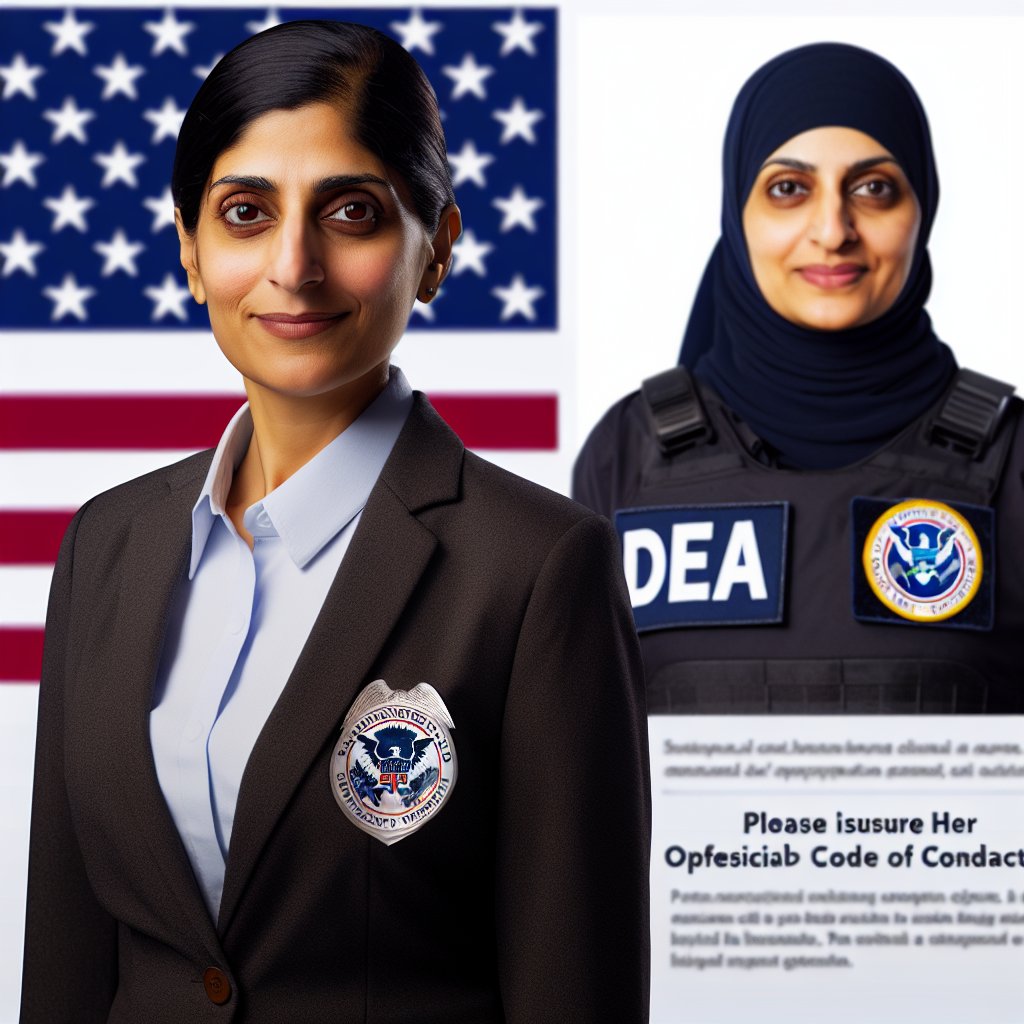Introduction
The Drug Enforcement Administration (DEA) plays a crucial role in enforcing drug laws.
The agency combats illegal drug trafficking and abuse.
DEA agents are at the forefront of this battle.
Therefore, it is imperative for them to adhere to a strict code of conduct and ethics.
As representatives of the DEA, agents are entrusted with upholding the law.
They also protect public safety.
Their actions and decisions directly impact the success of drug enforcement operations.
For this reason, ethical behavior is essential.
By following a code of conduct and ethics, DEA agents demonstrate their commitment to integrity.
They also uphold fairness and professionalism.
This commitment enhances the DEA’s reputation.
It also fosters trust within the community and among law enforcement agencies.
Moreover, the code of conduct serves as a guide for agents facing ethical dilemmas.
It helps agents in challenging situations.
The code provides a framework for making sound decisions.
Agents uphold the values of the DEA, even under pressure.
In essence, the DEA agent code of conduct and ethics is more than just a set of rules.
It reflects the agency’s dedication to justice, accountability, and ethical behavior.
By adhering to these standards, agents can truly make a difference in the fight against drug crime.
Background of the DEA Agent Code of Conduct
The history of the development of the DEA Agent Code of Conduct dates back to the establishment of the Drug Enforcement Administration (DEA) in 1973.
Transform Your Career Today
Unlock a personalized career strategy that drives real results. Get tailored advice and a roadmap designed just for you.
Start NowThe DEA was created to enforce the controlled substances laws and regulations of the United States.
Over the years, the DEA grew in size and scope.
It became essential to establish a set of guidelines and standards that would govern the behavior and decision-making of its agents.
This need led to the creation of the DEA Agent Code of Conduct.
History of the Development of the DEA Agent Code of Conduct
- 1973: DEA established to enforce drug laws.
- Need for guidelines and standards.
- Creation of the DEA Agent Code of Conduct.
The DEA Agent Code of Conduct is a comprehensive set of rules and principles.
DEA agents are expected to follow these rules in the course of their duties.
The code is designed to promote integrity, professionalism, and ethical behavior among DEA personnel.
Purpose of the Code in Guiding DEA Agents’ Behavior and Decision-Making
- Provides a framework for ethical behavior.
- Sets standards for professionalism.
- Guides decision-making in challenging situations.
The DEA Agent Code of Conduct serves as a crucial tool in maintaining public trust and confidence.
It ensures that DEA personnel uphold the highest standards of conduct.
Agents adhere to ethical principles while carrying out their law enforcement duties.
Significance of the DEA Agent Code of Conduct in Law Enforcement
The DEA Agent Code of Conduct is an essential document guiding agents’ behavior and decision-making.
It reflects the core values of the DEA.
The code underscores integrity, professionalism, and ethical conduct in law enforcement.
Key Principles of the DEA Agent Code of Conduct
DEA agents are expected to adhere to a set of key principles that guide their conduct and behavior.
These principles are crucial in upholding the integrity and reputation of the Drug Enforcement Administration.
Let us delve into each of these principles.
Integrity and Ethical Behavior
Integrity is the cornerstone of the DEA agent code of conduct.
Agents are expected to act with honesty, fairness, and transparency in all aspects of their work.
This includes conducting investigations with the utmost integrity and avoiding any conflicts of interest.
Furthermore, ethical behavior is paramount in carrying out duties related to drug enforcement.
Transform Your Career Today
Unlock a personalized career strategy that drives real results. Get tailored advice and a roadmap designed just for you.
Start NowAgents must adhere to a strict code of ethics, which prohibits actions such as accepting bribes.
They must avoid engaging in unethical practices or compromising the integrity of investigations.
Professionalism in Interactions
DEA agents are required to maintain a high level of professionalism in their interactions with the public.
They must also act professionally with other law enforcement agencies.
This entails treating all individuals with respect, courtesy, and fairness, regardless of their background or circumstances.
Moreover, professionalism extends to how agents conduct themselves during their duties.
Agents must exhibit a high degree of competence, expertise, and discipline in enforcement activities.
They must uphold the values of the DEA and the law enforcement profession at all times.
Respect for Diversity and Individual Rights
Respect for diversity and individual rights is a fundamental principle that DEA agents must uphold.
This means recognizing and valuing individual differences, including cultural, racial, and gender diversity.
Agents must treat all individuals with dignity and respect.
Furthermore, agents must uphold the constitutional rights of individuals.
This includes their right to due process, freedom from discrimination, and protection from unlawful search and seizure.
They must ensure that all enforcement actions respect the rights and liberties of individuals.
Compliance with Laws and Regulations Governing Enforcement
DEA agents are expected to comply with all laws and regulations governing drug enforcement activities.
This includes federal, state, and local laws related to drug enforcement.
Agents must also follow the policies and procedures established by the DEA itself.
They must stay informed about changes in laws and regulations and seek guidance from legal experts when needed.
Agents must ensure their actions comply with all applicable rules and standards.
Any violations of laws or regulations can have serious consequences for both the agent and the DEA as an organization.
Transform Your Career Today
Unlock a personalized career strategy that drives real results. Get tailored advice and a roadmap designed just for you.
Start NowMaintaining Public Trust Through Upholding Ethical Standards
The key principles of the DEA Agent Code of Conduct form the foundation of ethical behavior and professionalism.
Upholding these principles helps DEA agents maintain the trust and confidence of the public.
Agents uphold the values of the DEA by carrying out their duties with integrity and respect.
Learn More: School Resource Officers: Myths vs. Facts
Specific Guidelines for DEA Agents
- Confidentiality and discretion in handling sensitive information
- Use of force guidelines and protocols
- Reporting requirements for ethical violations or misconduct
DEA agents are held to the highest standards of behavior and ethics in carrying out their duties.
To ensure the integrity of the agency and uphold public trust, specific guidelines are in place for DEA agents to adhere to.
Confidentiality and Discretion
One of the most crucial aspects of being a DEA agent is the ability to handle sensitive information with the utmost confidentiality and discretion.
DEA agents often deal with classified information that could jeopardize ongoing investigations if leaked.
It is imperative for agents to understand the gravity of this responsibility.
They must uphold the trust placed in them by maintaining confidentiality at all times.
Agents must follow strict protocols when accessing, storing, and sharing sensitive information.
Any breaches of confidentiality can result in severe consequences, including termination and legal action.
Agents must exercise caution and discretion in all their communications.
This ensures the safety and success of investigations.
Use of Force Guidelines and Protocols
DEA agents are authorized to use force when necessary to carry out their duties effectively.
The use of force must adhere to strict guidelines and protocols.
These measures prevent unnecessary harm or escalation of situations.
Agents must use force only as a last resort.
They should prioritize de-escalation tactics whenever possible.
Training in proper use of force techniques is mandatory for all DEA agents.
Transform Your Career Today
Unlock a personalized career strategy that drives real results. Get tailored advice and a roadmap designed just for you.
Start NowThis training ensures agents can handle volatile situations professionally and with restraint.
Agents must constantly assess the level of force required in each situation.
They must be prepared to justify their actions if questioned.
Reporting Requirements for Ethical Violations and Misconduct
DEA agents are expected to conduct themselves with the highest standards of ethics and integrity at all times.
Any ethical violations or misconduct must be reported immediately to the appropriate authorities.
This is essential to uphold the credibility of the agency.
Agents have both moral and legal obligations to report any wrongdoing they witness or know about.
Reporting requirements ensure transparency and accountability within the agency.
They help maintain public trust in the DEA.
Failure to report ethical violations or misconduct can lead to serious repercussions for the agent involved.
It can also tarnish the reputation of the agency.
Agents must prioritize ethical behavior and hold themselves and their colleagues accountable for their actions.
Maintaining Integrity and Professionalism in DEA Duties
Specific guidelines exist to ensure the highest standards of behavior and ethics within the DEA.
By maintaining confidentiality and discretion, agents protect sensitive information.
Following use of force guidelines helps prevent unnecessary harm and uphold professionalism.
Adhering to reporting requirements promotes transparency and accountability.
Together, these measures enable DEA agents to fulfill their duties with integrity and professionalism.
Find Out More: Training Requirements for Campus Security Officers
Training and Education on the Code of Conduct
- Importance of ongoing training and education for DEA agents on ethical standards
- Continuous education ensures agents are up-to-date on ethical guidelines and best practices.
- It helps agents understand the importance of ethical behavior in maintaining public trust.
- Through training, agents learn how to identify ethical dilemmas and make sound decisions.
- Training also reinforces the consequences of violating the code of conduct.
Situations Where Agents Must Apply the Code of Conduct
- Dealing with informants and maintaining confidentiality.
- Handling evidence and ensuring its integrity throughout an investigation.
- Interacting with suspects and witnesses in a fair and respectful manner.
- Balancing the need for aggressive enforcement with respect for individual rights.
- Navigating situations where personal biases or conflicts of interest may arise.
Ongoing training and education on the code of conduct are essential for DEA agents.
This training helps agents carry out their duties ethically and maintain public trust.
Transform Your Career Today
Unlock a personalized career strategy that drives real results. Get tailored advice and a roadmap designed just for you.
Start NowIt equips agents with tools to navigate complex ethical dilemmas encountered in their work.
Training reinforces the importance of upholding the highest standards of integrity and professionalism.
By investing in continuous education, the DEA ensures agents are well-prepared to uphold its values and principles.
This commitment ultimately supports the agency’s mission of combating drug trafficking and promoting public safety.
Gain More Insights: Common Challenges Faced by TSA Officers on Duty

Enforcement of the Code of Conduct
- Internal mechanisms for monitoring and enforcing compliance with the code
- Consequences for violations of the code, including disciplinary actions
Enforcement of the DEA Agent Code of Conduct is essential to maintain professionalism.
The agency upholds integrity by ensuring that all agents meet high ethical standards.
Internal Mechanisms for Monitoring and Enforcing Compliance
The DEA uses internal processes to monitor agents’ behavior consistently.
Supervisors play a key role in evaluating agents’ actions in the field.
Furthermore, the agency performs regular audits and reviews to ensure compliance.
Performance metrics and assessments help the DEA identify deviations from the code.
The DEA also fosters a culture of accountability among its agents constantly.
Open communication and transparency create an environment of high standards.
Consequences for Violations of the Code
The DEA treats violations of the Code of Conduct with utmost seriousness.
Disciplinary actions are enforced to maintain trust and agency integrity.
Depending on violation severity, agents may receive verbal warnings or reprimands.
Suspension or termination from the agency is also possible in serious cases.
All disciplinary actions follow a fair and consistent structured process.
This process demonstrates the agency’s commitment to justice and accountability.
Violations can sometimes lead to legal consequences for agents involved.
Transform Your Career Today
Unlock a personalized career strategy that drives real results. Get tailored advice and a roadmap designed just for you.
Start NowMisconduct or illegal activities may result in criminal charges and prosecution.
Effective enforcement of the Code upholds the DEA’s reputation and effectiveness.
Accountability ensures agents serve with honor and integrity at all times.
Gain More Insights: Benefits of a Counterterrorism Specialist Career
Challenges in Upholding the Code of Conduct
- Pressure from superiors or colleagues to bend rules or cut corners
- Striking a balance between effective law enforcement and ethical considerations
One of the most significant challenges that DEA agents face is the pressure to bend rules or cut corners.
This pressure may come from superiors or colleagues in order to achieve a desired outcome quickly.
For example, they might be asked to overlook certain procedures or protocols.
DEA agents must remain steadfast in their commitment to upholding ethical standards when facing such pressure.
While it may be tempting to please superiors or colleagues by giving in, agents’ primary responsibility is to uphold the law.
Moreover, agents must also balance the need for effective law enforcement with ethical considerations.
In the pursuit of justice, it is easy to focus on results and neglect important ethical standards.
However, their actions must always comply with the law and ethical principles.
They need to carefully consider the consequences and act with fairness, integrity, and accountability.
One effective way to address these challenges is by seeking guidance from agency leadership and ethics committees.
Consulting experienced professionals helps agents navigate ethical dilemmas more effectively.
This approach ensures that they uphold the highest standards of conduct at all times.
Additionally, ongoing training and education on ethical principles strengthen agents’ decision-making skills.
Staying informed about the latest ethical standards and best practices improves their ability to act correctly during challenges.
Ultimately, maintaining a commitment to ethical behavior helps DEA agents uphold professionalism in their work.
By staying vigilant, seeking support, and continuously learning, agents can overcome challenges with integrity.
Transform Your Career Today
Unlock a personalized career strategy that drives real results. Get tailored advice and a roadmap designed just for you.
Start NowEthical Standards for DEA Agents
The DEA Agent Code of Conduct outlines ethical standards agents must uphold.
These standards ensure the integrity of every action taken by agents.
Adhering to these principles supports public trust in the agency.
The DEA’s credibility depends on consistent ethical behavior from its agents.
Maintaining these standards is crucial for the agency’s overall effectiveness.
Additional Resources
Part 52 – Solicitation Provisions and Contract Clauses | Acquisition …




